EVENT: Cicero hosts roundtable with Labour: Women in Tech and Darren Jones MP
by Roddy Thompson
20 March 2024
WATCH: Samantha Niblett, Founder of Labour: Women in Tech talk about her organisation.
This week, H/Advisors Cicero, in partnership with Labour: Women in Tech, was delighted to welcome Darren Jones MP, Shadow Chief Secretary to the Treasury, to a roundtable discussion on how best to champion female entrepreneurs and boost investment in the UK science and technology sectors.
Darren explained how a Labour government would be a strong ally to the tech sector and specifically to women in tech, adding that female leaders are an untapped resource in the UK economy. Citing Rachel Reeves’ claim during her Mais Lecture that harnessing female entrepreneurship could add £200bn to UK GDP, Darren emphasised that partnership between government and tech companies is vital.
Women’s careers in tech and investment in female entrepreneurship
The roundtable centred around the challenges that the next government will have to face in this area – particularly the lack of investment in female-founded companies, which receive less than 2% of venture capital funding. The discussions shed light on how investment programmes are often inadequate in both addressing the knowledge gap that precludes women from a career in tech, as well as in identifying the firms and individuals that most deserve and would most benefit from funding.
The discussion also looked at whether the lack of women in positions to make investment decisions has an impact in the lack of investment in female-founded companies, despite the appetite among institutional investors and impressive track records of returns. Potential solutions put forward included a B-Corp style seal of approval that companies can apply for to show their commitment to invest in women. Labour’s proposals to empower the British Business Bank (BBB) with a broader remit to expand access to capital, as well as its planned reforms to reform the Apprenticeship Levy into a Skills Levy, were highlighted as promising steps forward.
Participants emphasised the need for vocal backing from government for funding and skills programmes to increase visibility of the significant work that women in tech are making to the sector and the broader economy. Such initiatives must be sufficiently well-funded to avoid over-mentoring and deliver tangible benefits to recipients.
3 areas for developing women’s advancement in the tech sector
Three key areas were identified as important for advancing the position of women in tech:
- beginning with capital;
- then the connections which open the door to that capital;
- and lastly the contracts that help to match buying organisations with female-founded companies.
Darren Jones welcomed the points raised throughout the roundtable, which comes at an important time with Labour working on the delivery of three separate products that will seek to tackle the issues under discussion: the election manifesto, delivery notes (which can delve deeper into the policy detail), and Labour’s longer-term vision for government.
H/Advisors Cicero would like thank Samantha Niblett, CEO of Labour: Women in Tech. Find out more about Labour: Women in Tech’s work here: https://labourwomenintech.org/
Subscribe to our latest news and events via our UK Public Affairs newsletter.
20 March 2024
Scenarios for the top jobs
Our EU Public Affairs team presents the runners and riders for the top Defence jobs in the next EU legislative term.
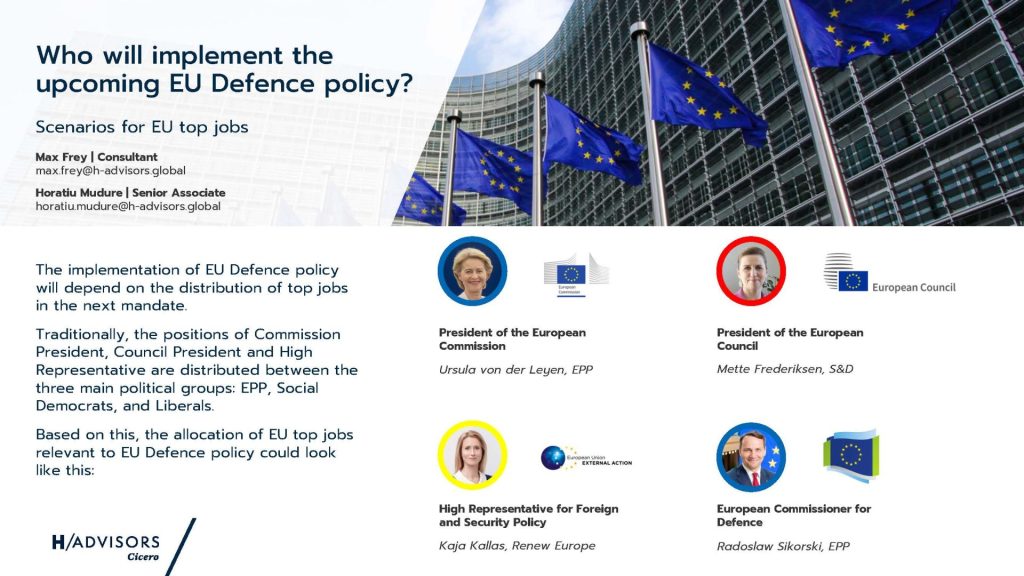
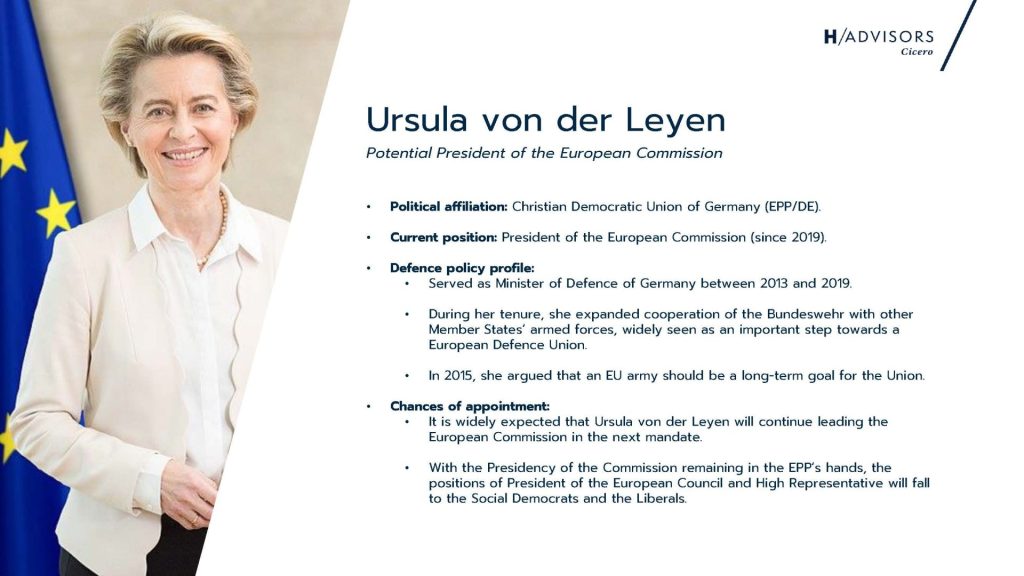
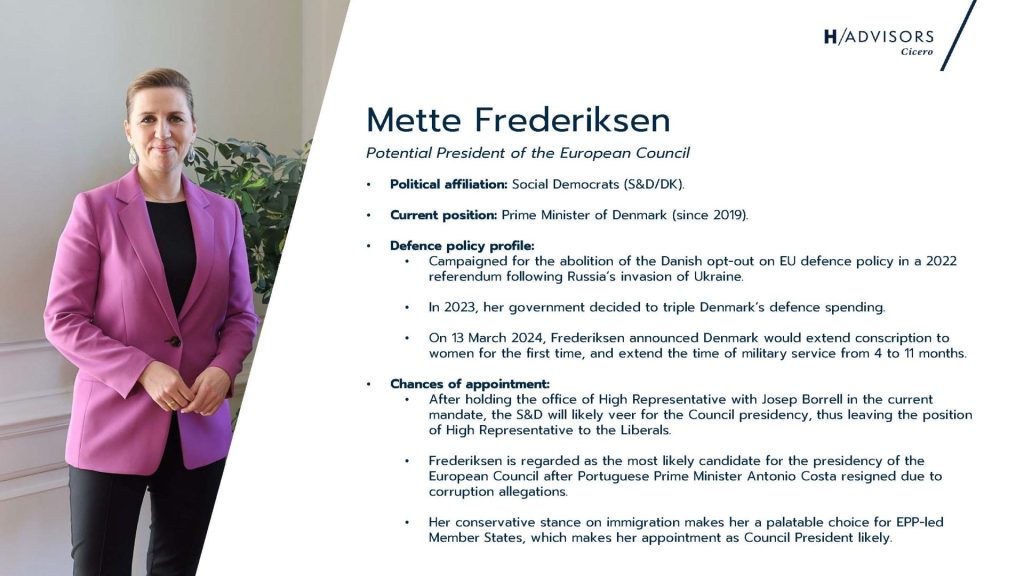
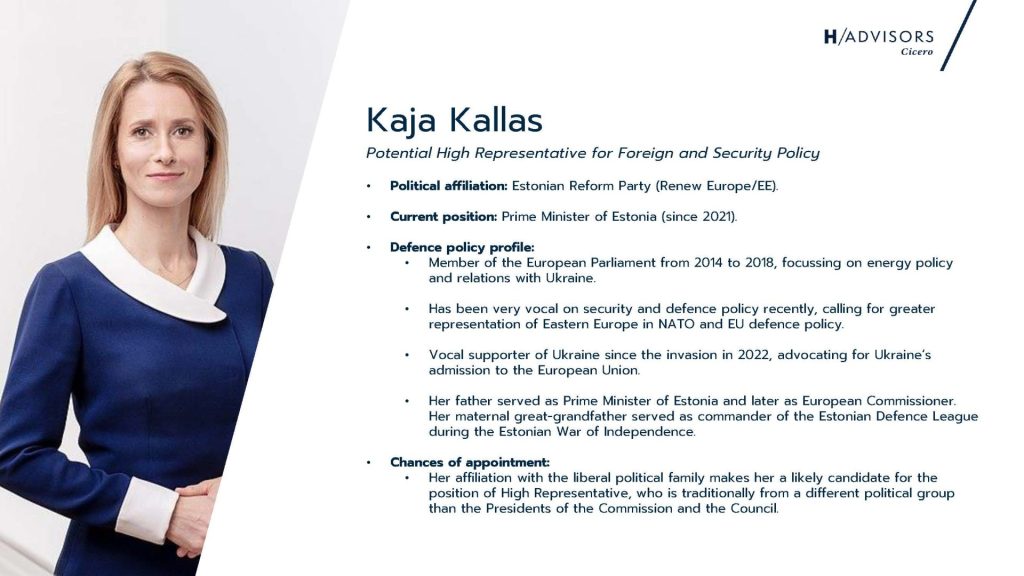
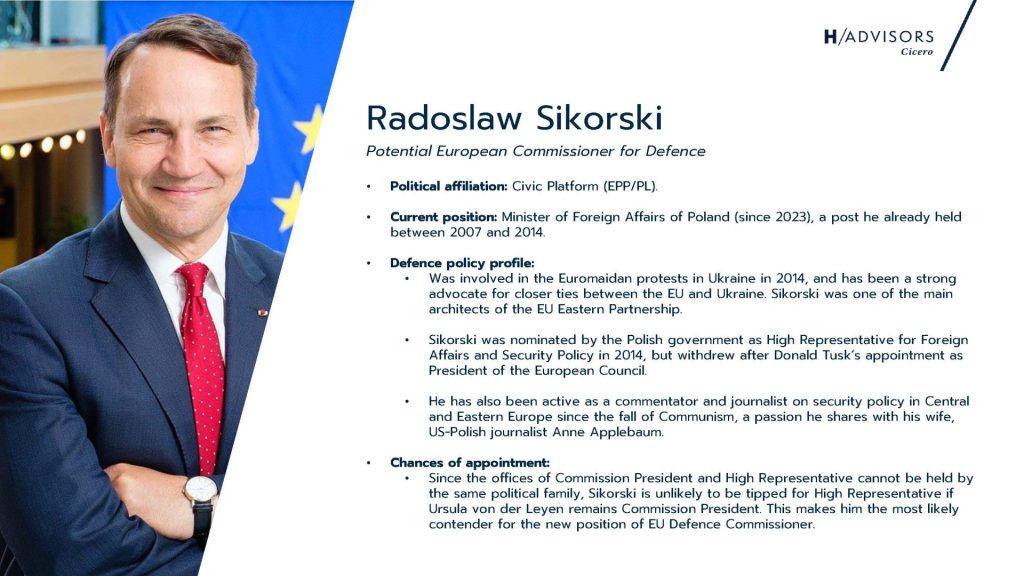
Subscribe to our EU Elections newsletter.
Get in touch at BrusselsPA@cicero-group.com
20 March 2024
H/Advisors Founding Partner and Executive Chairman, Iain Anderson has been named the most influential figure in UK public affairs in this year’s list in PRWeek.

PRWeek’s yearly Power Book is a comprehensive list of the most influential people in the UK’s PR and communications industry, and includes categorised Top 10 lists by sector.
Iain was announced today as the leading figure for Public Affairs (agency), citing his recent move from Conservative to Labour Party support, as well as “A New Partnership”, his recent independent report on business for Labour’s Jonathan Reynolds MP.
Earlier this month, Iain Anderson, CEO Mark Twigg, and Partner Sonia Khan were all named in the general Power Book 2024 list.
The full Public Affairs list on PRWeek can be seen here: https://www.prweek.com/article/1865210/prweek-uk-power-book-2024-top-10-public-affairs-agency
19 March 2024
In France, the 2024 European Parliament election is scheduled to be held on 9 June 2024. This note aims to summarise the French industry perspective on these elections and the required priority European Union (EU) reforms.
1. Autonomy and transition at the heart of the French industry’s preoccupations
According to a survey conveyed by the Direction Générale des Enterprises (DGE) and published on Tuesday 12 March by the French Ministry of the Economy, French businesses expect the next European Commission to focus on the “strategic autonomy” of the 27 EU member states. Specifically, 76% of respondents expect European policies to ensure the strategic autonomy and technological leadership of the EU. This first preoccupation is in line with the priorities of French President Emmanuel Macron, who regularly stresses the need to strengthen Europe’s independence from the United States and China.
Of equal importance to French industry will be the expectation that the EU’s executive will continue to focus on the ecological transition. 64% of the respondents called for a “transition towards a circular economy that is low-carbon and respects biodiversity”.
2. The desire to evolve in a Europe that simplifies norms and protects businesses from unfair international competition
Three quarters of the companies that responded to this survey called on the Commission to “evolve the conception methods of public policies”. Moreover, 60% called for it to focus “on implementing existing legislation by simplifying it”. According to the testimonies gathered, entrepreneurs consider the EU to be a source of “too many constraints” and “disconnected from economic and scientific reality”. On this topic, Bercy pointed out that France and Germany have been working towards administrative simplification since last year.
There is also a considerable concern (expressed by 49% of respondents) about unfair competition from third countries, and particularly Asia. “The consultation carried out by the DGE confirms companies’ expectations of a Europe that simplifies and protects our businesses”, reacted French Finance Minister Bruno Le Maire.
3. The sectorial priorities for the next EU legislative term
Tech and digital sector
Cigref, a network of major French companies and public administrations committed to the development of digital technology, published a position paper alongside three other European associations (Beltug in Belgium, CIO Platform Nederland in the Netherlands and Voice in Germany) on the regulation of the digital sector by the EU.
After the last few years devoted to “regulating the digital space and the data economy” (AI Act, the Data Act, the Cyber Resilience Act, the Digital Markets Act, the Digital Service Act, etc.), these associations hope that the EU will raise its ambitions in terms of innovation and technological leadership.
The position paper lists four priority areas of work:
- Europeans’ digital skills, by educating all citizens about digital tools, providing mechanisms for employees to adapt to technological developments and strengthening universities’ subjects on these topics;
- Independence of European companies, which are today dependent on American or Chinese suppliers;
- Investments in tech and digital companies; and
- Environmental impact of digital technology, by increasing the lifespan of the digital equipment and combating hardware obsolescence.
Energy sector
Équilibre des énergies (EdEn), a think tank specialising in industrial policies, stresses the need for a European industrial strategy that is properly focused on the climate and the economy, rather than an accumulation of objectives.
The think tank has made 35 recommendations, divided into nine key areas and two priorities:
- The effective reduction of greenhouse gas emissions (GHG), by implementing a directive on the development of low-carbon energies and by the EU taking concrete actions to achieve its carbon targets; and
- The reindustrialisation of the EU by 2030 in order to ensure an effective European decarbonisation.
According to EdEn, the European industries will need more electricity – may it be nuclear or from renewable energies – because more and more sectors and uses will be electrified in the next few years. Moreover, the electrification of the energy mix is a prerequisite for decarbonisation.
Subscribe to our EU Elections newsletter.
Get in touch at BrusselsPA@cicero-group.com
18 March 2024
The European Union (EU) is embarking on a bold journey towards a more robust and autonomous defence policy. This shift, driven by the evolving global security landscape and the ongoing war in Ukraine, has significant implications for the European defence industry, a key enabler of the EU plan. In this spotlight, we explore Europe’s defence ambitions, the indispensable role of industry in it, and the key considerations for turning the plan into success.
When political momentum meets spending ambitions
Shortly after the Russian invasion of Ukraine, the EU outlined its defence vision for the next 20 years. The “Strategic Compass on Security and Defence” committed the need for a robust European defence industry underpinned by strong R&D, smooth collaborative procurement, and reduced dependence on non-EU suppliers.
Two years later, the plan gained political traction. Ursula von der Leyen (a former defence minister) underscored in February that EU will be “turbocharging its defence industrial capacity in the next five years”, committing to create a Defence Commissioner role if she secures a second term as President. Internal Market Commissioner Thierry Breton further pitched a new ambitious €100bn fund for defence industry cooperation, a sentiment which was further echoed by French President Emmanuel Macron and German Chancellor Olaf Scholz.
Furthermore, ahead of the European elections, political parties have also included defence policy and spending into their manifestos, with the EPP listing defence as its number one priority, and PES championing “the development of the European defence industry.”
A first-ever defence industrial strategy
On 5 March the European Commission delivered the European Defence Industrial Strategy (EDIS): the EU’s plan to bolster its defence industry after decades of underinvestment. The plan includes:
- Legislative initiatives: A European Defence Industry Programme (EDIP) which will mobilise €1.5 billion that will bridge the gap between now and the next 2028-2035 financial period;
- Joint procurement: A Defence Industrial Readiness Board to perform the joint procurement function and support the implementation of the EDIP.
- Projects of common interest & sales mechanisms: Projects of common interest will focus on securing EU access to contested areas such as maritime, air, cyber and space, while a new Military Sales Mechanism will facilitate the availability of defence products.
The EU plan relies heavily on EU countries’ national industries, with participation in the EDIP being exclusively open to EU Member States, Associated Countries (e.g. Norway) and Ukraine. As a result, by 2030, EU countries should collaboratively procure at least 40% of defence equipment; spend at least 50% of their defence procurement budgets on products made in Europe; and trade at least 35% of defence goods between EU countries.
The Enablers: Europe’s defence industry
Europe’s defence industry has long called for an ambitious Defence Investment Programme and has recognised the sea of opportunities that the EU plan presents. The following types of companies will be particularly relevant to the EU plan:
- Aerospace and defence contractors which design, develop, and manufacture aircraft, missiles, satellites, and other airborne systems for military use.
- Electronics and communications companies that develop and manufacture communication equipment and other electronic systems used for military applications.
- Cybersecurity firms providing solutions and services which are also playing a growing role in the defence industry.
When pursuing opportunities under the EDIP, however, the following would be important for companies:
- Focus on competitiveness: Concentrate on the Plan’s strategic goal of improving EU competitiveness and strengthening the EU’s Defence Technological & Industrial Base (EDTIB).
- Collaboration is essential: With the EDIP encouraging collaboration, companies should consider partnering with other European entities.
- Political awareness: Companies should possess deep insights of the EU’s foreign and security policy priorities and demonstrate how their projects will contribute to those priorities.
Challenges and considerations
While the EU’s ambitions open doors for industry, significant challenges are expected to arise:
- National interests: With defence remaining a national responsibility, EU countries may be resisting the idea that some of their competencies are taken away.
- Financial contributions: As Commission Vice-President MargretheVestager noted, EDIP’s €1.5 billion is “an incentive” and that “the real funding comes from the Member States.” Securing such funding will be key for the success of the plan.
- Bureaucracy: Streamlining the complex bureaucratic procedures involved in collaborative projects and cross-border procurement will be vital.
- Skilled workforce: Meeting the increased demand for skilled personnel, from engineers to project managers, requires addressing potential workforce shortages.
Despite the challenges, external events, such as elections in other countries and a potential lower US commitment to NATO in the future could serve as catalyst and urge EU countries to strengthen their defence policy integration, and spending at EU level.
Get in touch at BrusselsPA@cicero-group.com
12 March 2024
On Tuesday we hosted Conservatives in the City and Paul Maynard MP to speak to an invited group of attendees about the pensions industry.

The event was conducted under Chatham House Rule.
To stay informed about other upcoming events and insights from our UK Public Affairs team, subscribe to our monthly newsletter, or get in touch with us at ukpublicaffairs@h-advisors.global.
